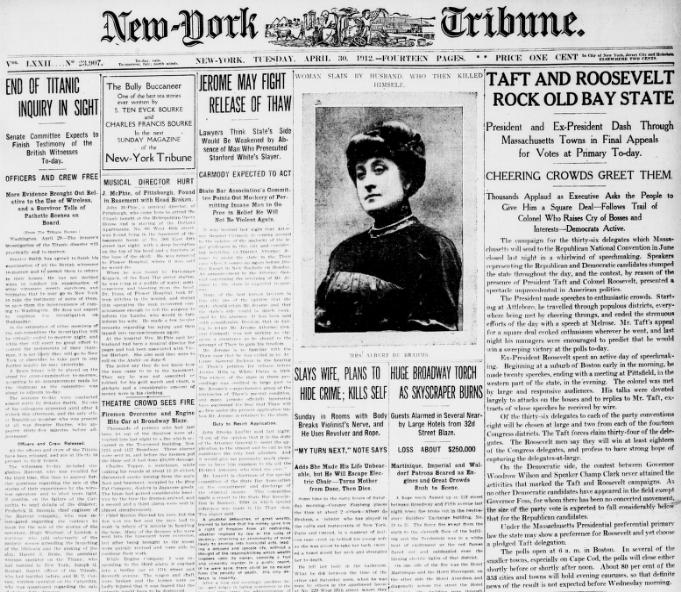|
Moderated by NW Okie! |
Volume 14 , Issue 182012Weekly eZine: (374 subscribers)Subscribe | Unsubscribe Using Desktop... |
100 Years Ago Today - April 30, 1912

The headlines of the New-York Tribune, dated Tuesday, 30 April 1912, a hundred years ago, read: "Taft and Roosevelt Rock Old Bay State." President and Ex-President dash through massachusetts towns in final appeals for votes at Primary as cheering crowds greet them. Thousands applaud as Executive asks the people to give him a square deal. He follows trail of Colonel who raised cry of bosses and interests. Democrats Active.
It was a campaign for the 36 delegates which Massachusetts would send to the Republican National Convention in June, 1912, as the it closed that night in a whirlwind of speechmaking. Speakers representing the Republican and Democratic candidates stumped the state throughout the day, and the contest, by reason of the presence of President Taft and Colonel Roosevelt, presented a spectacle unprecedented in American politics.
President Taft made speeches to enthusiastic crowds, starting at Attleboro, Taft travelled through populous districts, everywhere being met by cheering throngs, and ended the strenuous efforts of the day with a speech at Melrose. MR. Raft's appeal for a square deal evoked enthusiasm wherever he went, and that night his managers were encouraged to predict that he would win a sweeping victory at the polls the next day.
It was ex-president Roosevelt that spent an active day of speechmaking. beginning at a suburb of Boston early in the morning, he made twenty speeches, ending with a meeting at Pittsfield, in the western part of the state, inn the evening. The colonel was met by large and responsive audiences. His talks were devoted largely to attacks on the bosses and to replies to Mr. Taft, extracts of whose speeches he received by wire.
We find that back in 1912, on the Republican side, of the 36 delegates to each of the party conventions eight would be chosen at large and two from each of the 14 Congress districts. The Taft forces claim 34 of the delegates. The Roosevelt men say they will win at least 18 of the Congress delegates, and profess to have strong hope of capturing the delegates at large.
On the Democratic side, the contest between Governor Woodrow Wilson and Speaker Cahmap Clark never attained the activities that marked the Taft and Roosevelt campaigns. As no other Democratic candidates have appeared in the field except Governor Foss, for whom there had been no concerted movement, the size of the party vote was expected to fall considerably below that for the Republican candidates.
Under the Massachusetts Presidential preferential primary law the state may show a preference for Roosevelt and yet choose a pledged Taft delegation. The polls opened at 6 a.m. in Boston. In several of the smaller towns, especially on Cape Cod, the polls closed either shortly before or shortly after noon. About 80 per cent of the 353 cities and towns held evening caucuses, so that definite news of the result was not expected before Wednesday morning.
| View or Add Comments (0 Comments)
| Receive
updates ( subscribers) |
Unsubscribe
| © . Linda Mcgill Wagner - began © 1999 Contact Me | |
